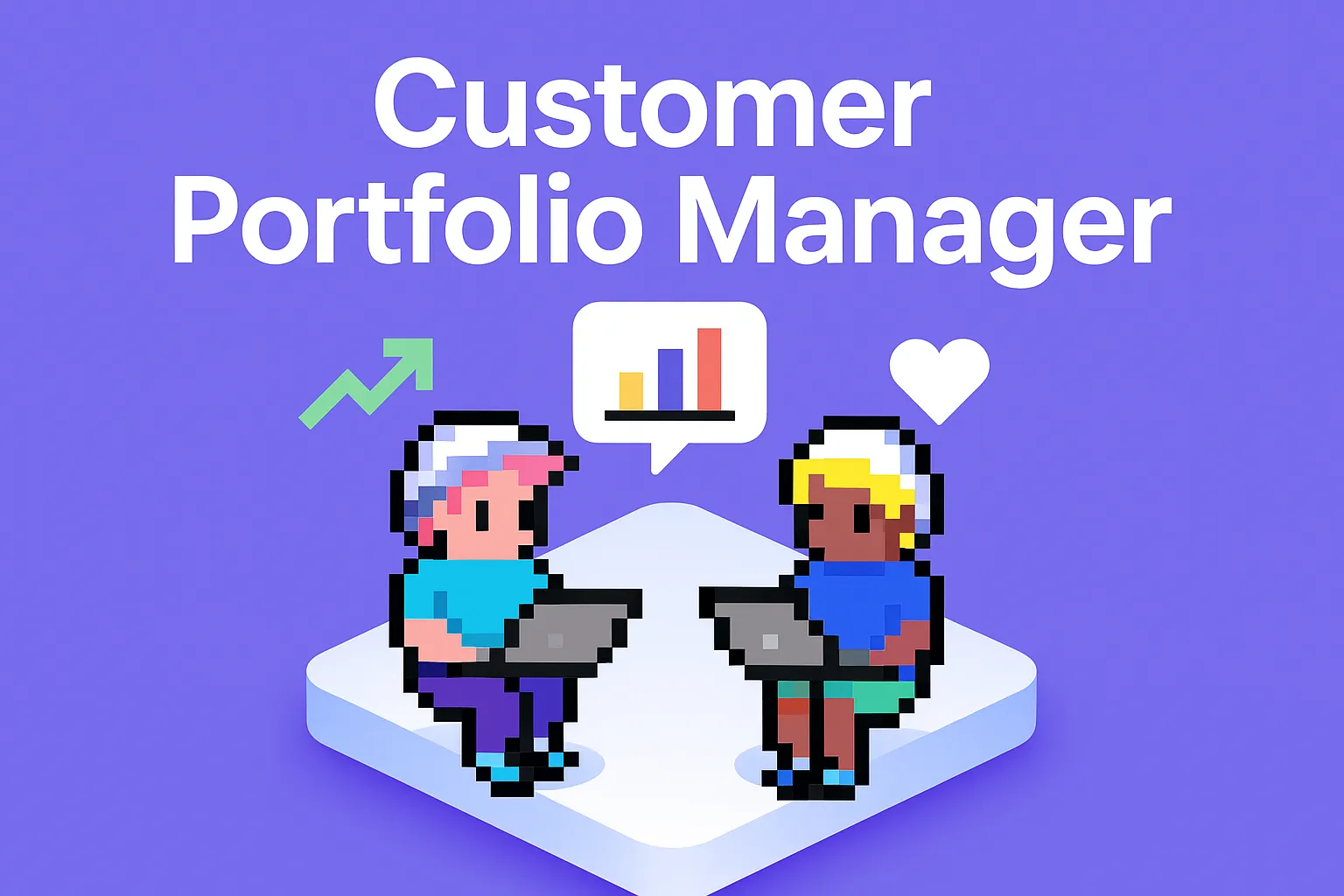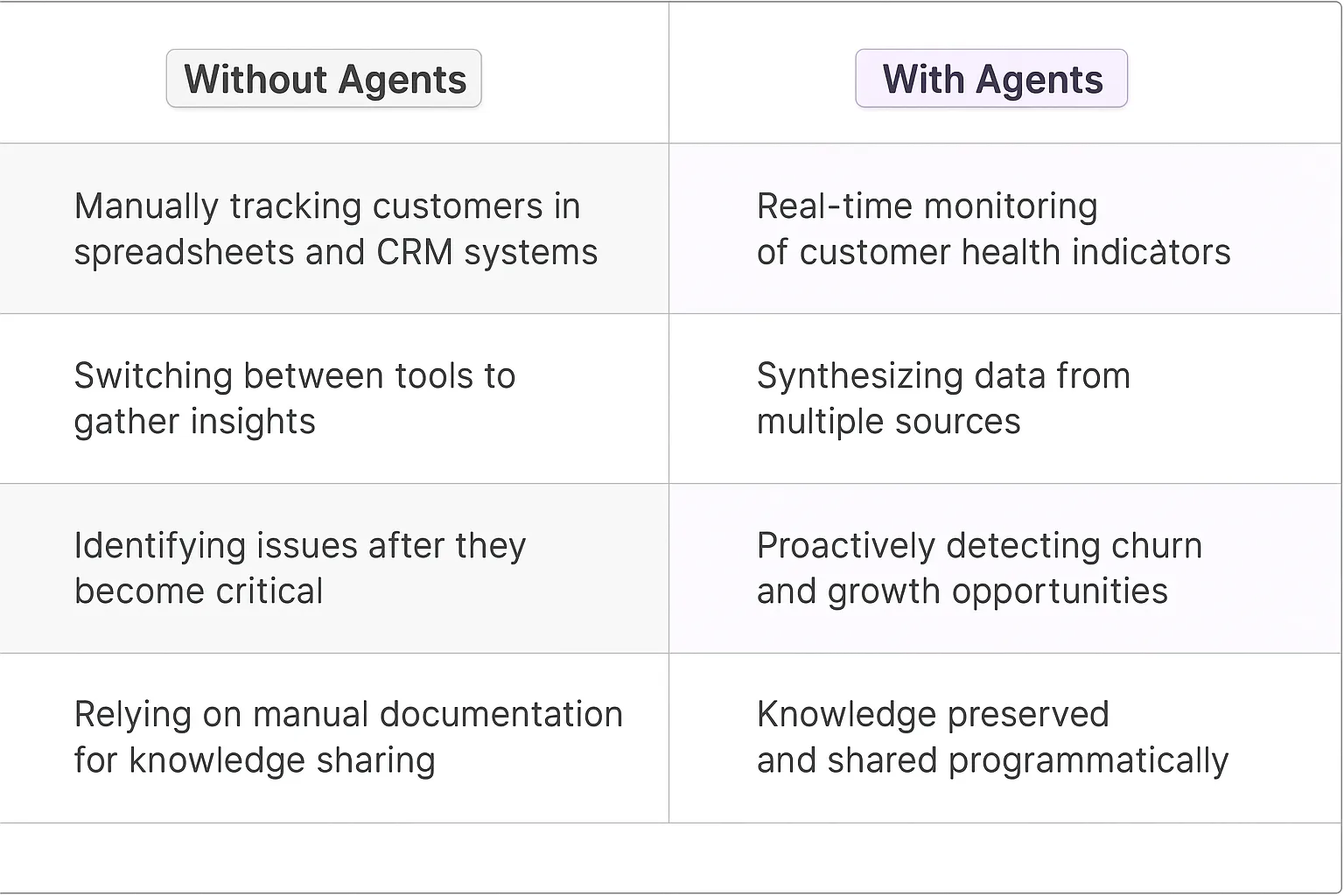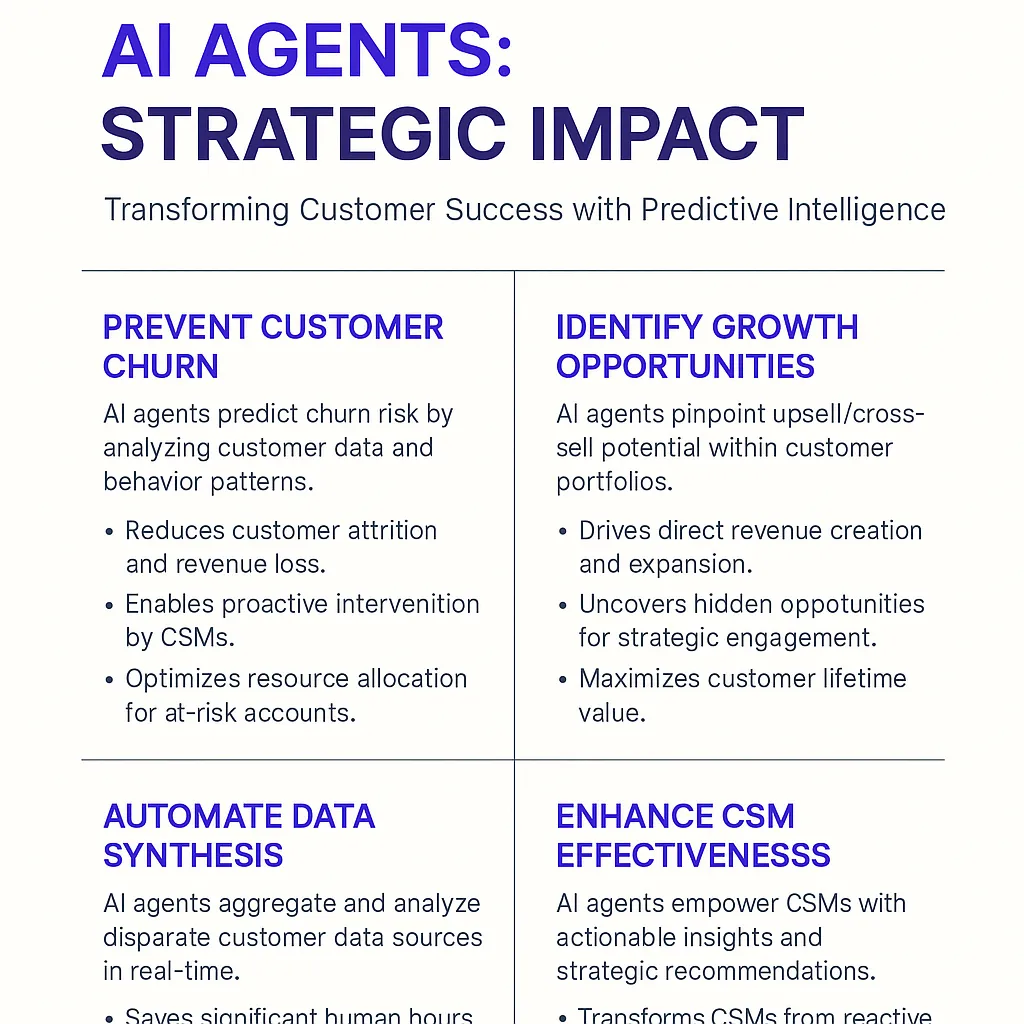Customer Portfolio Manager is a sophisticated AI-powered system that acts as a digital teammate for customer success teams. It continuously monitors customer relationships, analyzes interaction patterns, and provides actionable insights across entire customer portfolios. Unlike traditional CRM tools that simply store data, this system actively participates in relationship management by identifying risks, opportunities, and patterns that humans might miss.

Portfolio managers traditionally juggled multiple tools and manual processes to track customer relationships. They'd spend hours in spreadsheets, CRM systems, and email threads, trying to piece together customer insights. The cognitive load was intense - switching between dashboards, maintaining contact logs, and attempting to spot patterns across vast datasets. Most relied on basic automation rules and periodic manual reviews, missing crucial signals in customer behavior.
Digital teammates fundamentally transform how portfolio managers operate. They function as proactive relationship monitors, continuously analyzing customer interaction patterns and flagging meaningful changes in real-time. Think of them as specialized co-pilots who excel at pattern recognition across complex datasets.
The most compelling advantage is their ability to surface non-obvious insights. While humans excel at relationship building, AI agents detect subtle indicators of customer health - changes in communication frequency, sentiment shifts in support tickets, or unusual product usage patterns. They'll notice when a typically responsive customer goes quiet or when usage metrics suggest potential churn risk.
These digital teammates also eliminate the cognitive overhead of context-switching. Instead of manually piecing together information from multiple sources, portfolio managers receive synthesized insights that combine data from CRM, usage analytics, support tickets, and communication history. This allows them to focus on strategic relationship building rather than data gathering.
The network effects are particularly interesting - as these AI agents learn from interactions across the customer portfolio, they become increasingly skilled at identifying early warning signs and growth opportunities. They develop an understanding of which patterns typically precede customer expansion versus those that signal potential problems.
For growing teams, AI agents serve as institutional memory banks, maintaining detailed context about every customer relationship. This proves invaluable when onboarding new portfolio managers or during team transitions, ensuring no crucial customer insights are lost in the handover process.

The most interesting aspect of AI in customer portfolio management isn't just the automation of routine tasks - it's the compound learning effects across customer interactions. When an AI agent identifies a successful intervention that prevented churn in one account, that learning gets applied across the entire portfolio instantly.
This creates a powerful flywheel effect: each customer interaction makes the AI smarter at managing similar situations across all accounts. The traditional model where CSMs had to manually share best practices through meetings and documentation gets transformed into programmatic learning at scale.
The end result is that customer success teams can shift from reactive firefighting to proactive portfolio optimization. Instead of CSMs spending hours gathering data for QBRs, they can focus on having strategic conversations informed by AI-generated insights. This isn't about replacing human judgment - it's about augmenting it with pattern recognition across thousands of customer touchpoints.

The versatility of AI agents in Customer Portfolio Management creates transformative opportunities across multiple sectors. Drawing from my experience working with growth-stage companies, I've observed how these digital teammates drive significant value when integrated thoughtfully into existing workflows.
What's particularly fascinating is how AI agents adapt to industry-specific nuances while maintaining consistent performance improvements. They're not just handling routine tasks - they're actively participating in complex decision-making processes that traditionally required extensive human oversight.
The real power lies in their ability to process vast amounts of customer data while maintaining personalized attention to each account. This dual capability has proven especially valuable in sectors where relationship management intersects with data-driven decision making.
Let's dive into specific examples where these AI agents are creating measurable impact across different industries. Each case demonstrates unique applications that go beyond basic automation, showing how AI can enhance human capabilities rather than replace them.
The real estate industry faces a unique challenge - managing hundreds of property investors while maintaining personalized relationships at scale. I've seen countless real estate investment firms struggle with this, often resorting to generic quarterly updates that fail to truly engage their clients.
A Customer Portfolio Manager AI Agent transforms this dynamic by creating tailored communication and investment strategies for each client. The agent analyzes individual investor preferences, risk tolerance, and past investment behaviors to craft personalized property recommendations and market insights.
For example, when a new luxury development breaks ground in Austin, the AI agent automatically identifies investors who've previously shown interest in similar properties or have expressed a desire for Texas real estate exposure. It then generates detailed investment proposals that align with each investor's portfolio strategy and financial goals.
The real power emerges in the proactive monitoring capabilities. The agent continuously tracks market conditions, property performance, and investor sentiment, triggering alerts when portfolio rebalancing opportunities arise. When cap rates in a particular submarket start trending unfavorably, the agent can draft preliminary exit strategy recommendations for affected properties, complete with data-driven justifications.
What's particularly fascinating is how this shifts the role of human portfolio managers. Rather than spending hours sifting through market reports and client histories, they can focus on high-value activities like relationship building and complex negotiation. The AI agent becomes their research analyst, data scientist, and strategic advisor rolled into one.
This isn't just about efficiency - it's about creating a new paradigm for investor relations where every client, regardless of portfolio size, receives institutional-grade attention and service. The firms that embrace this approach will fundamentally reshape client expectations in real estate investment management.
I've spent years in venture capital watching partners and associates drown in spreadsheets trying to manage their portfolio companies. The traditional approach of quarterly check-ins and basic financial tracking just doesn't cut it anymore in an ecosystem where speed and insight determine winners.
A Customer Portfolio Manager AI Agent radically transforms how VCs support their portfolio companies by creating a continuous feedback loop of data and insights. The agent monitors everything from hiring patterns and burn rates to social sentiment and competitive movements across the entire portfolio.
When one of our SaaS portfolio companies shows declining revenue retention, the AI agent doesn't just flag the issue - it correlates this with product usage patterns, support ticket trends, and market conditions to identify the root cause. It then pulls relevant insights from similar situations across the portfolio's history to suggest tactical interventions.
The network effects really kick in when the agent starts cross-pollinating insights between portfolio companies. If a fintech startup in Boston figures out a brilliant customer acquisition strategy, the agent can identify other portfolio companies that might benefit from similar approaches, automatically adjusting for market differences and company stage.
What makes this particularly powerful is the agent's ability to synthesize both structured and unstructured data. It processes everything from founder emails and board decks to GitHub activity and app store reviews, building a comprehensive view of company health that goes far beyond traditional metrics.
The most successful VCs will use these AI agents not just as monitoring tools, but as strategic partners in portfolio management. They'll help identify when companies need to raise their next round, which startups should be talking to each other, and where the biggest risks and opportunities lie across the portfolio. This isn't about replacing the VC's judgment - it's about giving them superhuman pattern recognition abilities across their entire portfolio.
Implementing a Customer Portfolio Manager AI agent requires careful navigation of several complex factors that directly impact success. The depth of these challenges often catches teams off-guard, especially when scaling beyond initial pilot programs.
Data integration poses the first major hurdle. Customer Portfolio Manager AI agents need to pull information from multiple systems - CRMs, billing platforms, support tickets, and communication channels. Each integration point introduces potential failure modes and data consistency issues.
The AI models themselves present another technical challenge. Training these models requires massive amounts of historical customer interaction data, which many companies lack in sufficient quality or quantity. Edge cases and unusual customer scenarios often lead to degraded performance without extensive retraining.
The human side of implementation often proves more difficult than the technical aspects. Account managers and customer success teams may resist adoption, fearing job displacement rather than seeing the AI agent as a digital teammate that handles routine tasks.
Setting appropriate expectations with customers also requires delicate handling. Some clients may feel devalued if they perceive their account is being "managed by a machine." Clear communication about the AI agent's role as an enhancer of human relationship management, not a replacement, becomes crucial.
Customer portfolio management involves handling sensitive business data, creating significant compliance requirements. The AI agent must maintain strict data access controls while still having enough information to make meaningful decisions. Geographic data sovereignty rules add another layer of complexity, especially for companies operating across multiple jurisdictions.
Defining success metrics for Customer Portfolio Manager AI agents proves surprisingly challenging. While basic metrics like response time and task completion are straightforward, measuring the quality of customer relationship management requires more nuanced approaches. Creating balanced scorecards that combine quantitative and qualitative measures becomes essential for proper evaluation.
The integration of AI agents into customer portfolio management marks a fundamental shift in how businesses maintain and grow customer relationships. These digital teammates don't just automate tasks - they create a new paradigm where data-driven insights and human relationship skills combine to deliver unprecedented value. The network effects of shared learning across customer portfolios, combined with the ability to maintain personalized attention at scale, make this technology particularly powerful.
The most successful implementations will be those that position AI agents as enhancers of human capabilities rather than replacements. As these systems continue to evolve, we'll likely see even more sophisticated applications that further blur the line between human and machine capabilities in customer success. The key to success lies in thoughtful implementation that prioritizes both technological capability and human relationship management.